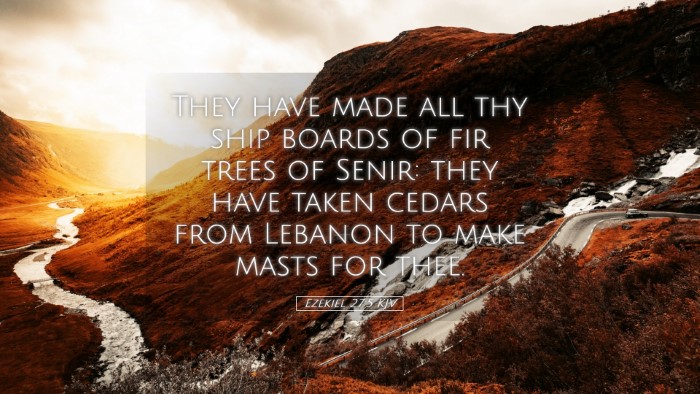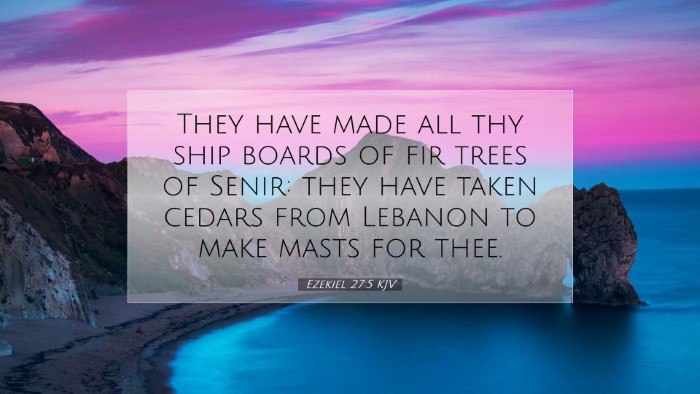Commentary on Ezekiel 27:5
Ezekiel 27:5: "They have made all thy shipboards of fir trees of Senir: they have taken cedars from Lebanon to make masts for thee."
Introduction
This verse is situated within a wider passage where the prophet Ezekiel delivers an extensive lamentation for Tyre, a wealthy trading city located on the coast of Phoenicia. The imagery in this verse, specifically referring to the materials used in shipbuilding, reveals the opulence of Tyre's maritime enterprise and its significant economic power in the ancient world. The use of valuable materials such as fir trees from Senir and cedar from Lebanon not only reflects the wealth of Tyre but also signifies its connections to other regions and its extensive trade networks.
Exegesis of Key Elements
Shipboards of Fir Trees of Senir
Fir trees from Senir represent a noteworthy feature in this verse. In the context of Old Testament literature, Senir is often associated with the Hermon mountain range, which is known for its towering trees. Matthew Henry emphasizes that such materials were carefully chosen for their durability and quality, understanding that the grandeur of Tyre's ships symbolized its elevated position among the nations.
Cedars from Lebanon
The mention of cedars from Lebanon aligns with the biblical tradition of considering the cedar tree as a symbol of strength and prestige. Albert Barnes highlights that these cedars were renowned in the ancient world for their quality. Tyre’s use of these mighty timbers for masts not only indicates its maritime capability but also underscores its reliance upon and domination of resources within the region.
Theological Insights
The theological implications of Ezekiel 27:5 serve to remind readers of God's sovereignty over nations and their ultimate fates. Tyre's prosperity and pride, indicated by this verse, are starkly contrasted with the impending judgment that the prophet soon foretells. Adam Clarke notes that the grandeur of Tyre, as illustrated in this verse, serves as a precursor to its downfall. This serves as a powerful reminder of the transitory nature of human pride and the eventual reality of divine judgment.
Divine Judgment and Human Vanity
- Pride: The opulence of Tyre is depicted in such a way to emphasize its pride and reliance on earthly treasures.
- Temporal Wealth: Thus, the verse acts as a foreshadowing of the eventual destruction that awaits those who place their trust in riches rather than in God.
- Hope and Restoration: Even in judgment, there remains a thread of hope for restoration, a common theme in the prophetic literature that can inspire believers to reflect upon their own spiritual integrity.
Historical Context
Understanding the historical backdrop of Tyre is essential for grasping the full meaning of this verse. As a powerful maritime city, Tyre facilitated trade across the Mediterranean, amassing wealth and influence. Historical records from ancient texts corroborate its significance in commerce. Matthew Henry illustrates how the detailed description of Tyre’s ships serves to highlight the city’s previously unmatched power, which makes its eventual demise all the more tragic for its inhabitants.
Materials Symbolizing Collaboration and Trade
The detailed mention of specific materials points towards the collaborative nature of trade in the ancient Near East. The relationships between neighboring nations were often built on mutual benefit, thus enhancing our understanding of the geopolitical landscape described in Ezekiel. This invites theologians and scholars to explore how economic interdependence affects spiritual and moral practices within societies.
Application for Modern Believers
This commentary on Ezekiel 27:5 invites introspection among contemporary Christians. In a world rife with materialism and pride, believers are called to examine their own reliance on earthly possessions and power. Just like Tyre, communities today may be tempted to pursue success at the cost of spiritual integrity.
Lessons Learned
- Stewardship: The faithful management of resources is essential for spiritual growth and community welfare.
- Humility: A spirit of humility must permeate our accumulations, as all resources ultimately belong to God.
- Dependence on God: True security and strength come not from material wealth but from faith in God’s provision.
Conclusion
Ezekiel 27:5 serves as a powerful reminder of the interplay between pride, material prosperity, and divine judgment. By reflecting on the historical significance and the theological implications within this verse, modern readers are challenged to reassess their values, priorities, and reliance on earthly treasures. This passage is not merely historical; it is a timeless call to faithfulness and reliance on God amidst the changing tides of fortune.
As we delve deeper into the implications of this verse, it becomes clear that the lessons derived are meant to guide both individual believers and the broader church community toward a posture of humility, stewardship, and unwavering trust in God.


